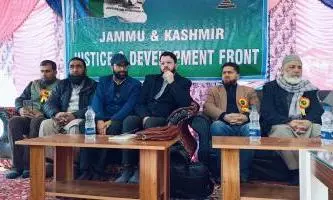
Truth can be suppressed but not silenced: Kashmir parties on ban of Mirwaiz-led AAC
text_fieldsThe Centre’s banning of the Awami Action Committee (AAC), led by moderate Hurriyat chairman Mirwaiz Umar Farooq, under the UAPA on the allegation that it has been involved in supporting terrorist activities and engaging in anti-India propaganda, has faced opposition from various political parties, including the ruling National Conference (NC) and the opposition Peoples Democratic Party (PDP).
The Union home ministry, in a notification issued on Tuesday, declared the AAC, a socio-politico-religious organisation based in Srinagar, as an unlawful association under the provisions of the Unlawful Activities Prevention Act, 1967, and imposed a five-year ban on it, citing its alleged involvement in unlawful activities that threaten the integrity, sovereignty, and security of the country.
The ministry accused AAC members of supporting terrorist activities, engaging in anti-India propaganda, and mobilising funds for secessionist and separatist agendas in Jammu and Kashmir.
The notification further referenced four cases filed against Mirwaiz Umar Farooq by the Jammu and Kashmir police and one case by the National Investigation Agency (NIA) against his former spokesperson, Aftab Ahmad Shah, as justification for the ban, asserting that the government was firmly convinced of the need to declare the AAC an unlawful entity.
The order stated that the organisation’s actions, including mobilising funds and spreading secessionist ideology, posed a serious threat to national security and public order.
Reacting to the ban, Mirwaiz Umar Farooq, who also serves as the chief cleric of Kashmir, denounced the decision on social media, describing the AAC as an organisation that has consistently advocated for the aspirations and rights of the people of Jammu and Kashmir through peaceful and democratic means.
He linked the move to the broader policy of political suppression following the abrogation of Article 370 in August 2019, arguing that the ban was a continuation of efforts to silence Kashmiri voices through force and intimidation.
He claimed that the AAC members had endured imprisonment, hardships, and even martyrdom in their pursuit of a peaceful resolution to the Kashmir issue through dialogue and reconciliation.
Supporting Mirwaiz’s stance, PDP president and former J&K chief minister Mehbooba Mufti criticised the government’s decision, terming it another blow to Kashmir’s political and social fabric and cautioning that silencing dissent would only escalate tensions rather than resolve them. She urged the J&K administration to intervene and prevent such measures, emphasising that democracy entails protecting fundamental rights and not merely holding elections. She accused the central government of using heavy-handed tactics to further the Bharatiya Janata Party’s (BJP) political agenda at the cost of democratic principles and constitutional safeguards.
Senior NC leader Ali Muhammad Sagar also expressed his dismay over the ban, calling it an extension of the Union government’s “iron-fist policy” against political figures and organisations in Kashmir.
He lamented that both the AAC and the Jammu and Kashmir Ittihadul Muslimeen (JKIM), another outfit recently banned under the UAPA, had played crucial roles in fostering peace and communal harmony in the region. He urged the government to adopt a policy of reconciliation rather than alienation, arguing that Mirwaiz and like-minded figures should be engaged as stakeholders in peace-building rather than being sidelined.
In addition to banning the AAC, the home ministry also imposed a five-year ban on the JKIM, headed by Masroor Abbas Ansari, which has been affiliated with the moderate Hurriyat Conference.
The notification accused JKIM of promoting anti-national activities, sowing disaffection among the people, and encouraging armed resistance against the Indian state, asserting that the organisation’s activities posed a threat to national stability.












